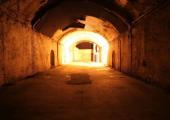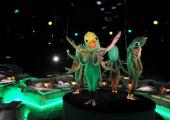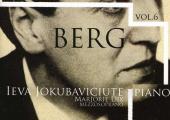Bear with me while, like supergroomed rising star Miloš Karadaglić retuning his guitar to a mellower vein, I adjust my concert-hall vocab and describe this as a no-gimmicks sell-out gig underground with young musicians from the London Philharmonic’s Foyle Future Firsts scheme presenting two varied sets and Karadaglić headlining. And now I’ll just revert to old habits and declare the meat to be a slice of Classicism chromatically spiced (Mozart) and a 20th-century maverick pushing Neo-Baroque into near-atonality (Stravinsky), our top guitarist serenading by way of late-night coda. All this to listen to with the intent of a seasoned concertgoer or to doze to with drink in hand, as you please.
Not that some of the sweet juve players were entirely cool with it. When you've always kept your audience at arm's length in a recital space, it can't be easy to find folk at tables right under your nose texting and quaffing. But the point is that this was good practice even for the less seasoned meeters-and-greeters, since the set-up had to include introductions varying from the read-out high-falutin programme note your average newcomer to classical cabaret just wouldn't get to a bluff line in curt preface: of the Poulenc Sonata for trumpet, trombone and horn, we were told, "One critic said that this was 18th-century music with wrong notes. They're not wrong notes, and we hope you like it."
I did, and I also liked bassoonist Laura Vincent's personable introduction to the two movements of Stravinsky's Septet, toughest numbers on the programme for which there was no avoiding a bit of explanation about a passacaglia and a gigue verging on atonality; she even got away with the "Stravinsky was the Madonna of his time" line. And James Turnbull is a natural, brimming with genuine enthusiasm for one of the best oboe pieces not actually written for oboe, as he put it: "Nightclub 1960" from Piazzolla's History of the Tango, transcribed from the flute-and-guitar original. He delivered it with panache alongside subtle harpist Elizabeth McNulty, whose earlier glissandi in the Debussy Trio had showered stardust over late, lamented Humphrey Lyttleton's stuffy but ever-atmospheric venue (reprieved, I'm delighted to hear, from imminent execution).
 The "sets" were well thought out in chunks of 25 minutes each, the first sandwiching the Debussy and a movement from the Ravel duo-sonata - stunningly executed by violinist Emily Dellit and cellist Arturo Serna - between Stravinsky's trio arrangement of numbers from The Soldier's Tale, and the Poulenc, showcasing a nice line in vibrato-ed trumpet song from Ellie Lovegrove. Good to know, too, that laughing at musical humour is not the prerogative of all-too-knowing Wigmore old-timers. The slow movement from Mozart's Quintet for piano and winds was the stilling heart of the second sequence, nicely set up by a Julian Anderson miniature and bringing together seven of the 14 players (most of them pictured above) sharing the platform for the later Stravinsky. Some of the groups need to loosen up and just enjoy the freedom such a space can give them, but again, it's all good practice, and drew the listeners in even as the old air con chuntered and the bar flies chattered.
The "sets" were well thought out in chunks of 25 minutes each, the first sandwiching the Debussy and a movement from the Ravel duo-sonata - stunningly executed by violinist Emily Dellit and cellist Arturo Serna - between Stravinsky's trio arrangement of numbers from The Soldier's Tale, and the Poulenc, showcasing a nice line in vibrato-ed trumpet song from Ellie Lovegrove. Good to know, too, that laughing at musical humour is not the prerogative of all-too-knowing Wigmore old-timers. The slow movement from Mozart's Quintet for piano and winds was the stilling heart of the second sequence, nicely set up by a Julian Anderson miniature and bringing together seven of the 14 players (most of them pictured above) sharing the platform for the later Stravinsky. Some of the groups need to loosen up and just enjoy the freedom such a space can give them, but again, it's all good practice, and drew the listeners in even as the old air con chuntered and the bar flies chattered.
Total silence, on the other hand, greeted the star turn. Fair enough, 28-year-old Karadaglić has a new CD to flog, his first for Deutsche Grammophon. Surely conscious of the matinee-idol looks which are going to be a selling point, he accounted for himself in a manner both much slicker and at the same time seemingly less sincere than the youngsters. But he was here on the eve of his Wigmore recital to show his artistry, and if the injunction "let's rock" didn't translate into the results, we did have more than a sample of his poetic soul. I'm no doyen of the classical guitar, and the only time I've heard the colours of a full orchestra in it was a year ago, from that absolute master Paco Peña, but there were certainly the shades and freedoms of a fine artist in the Albéniz pieces and the lullaby-esque Tarrega encore he gave us.
 Karadaglić makes much of his pride in the Montenegran motherland, and finds there's no place like home every time he plays Carlo Domeniconi's variations on a Turkish song, Koyunbaba. Well, it's not great music, even if the tune it reflects upon is of the essence, but this was just what we needed at coming up to 11 o'clock: a late-night meditation that had an air of the improvised about it. Which again is the highest praise, and makes me wonder if real improvisation might not be the next step for relaxed "classical" cabaret nights like this. Bravo to the glammy ladies of Limelight for setting them up and moving them forward; they'll surely run and run.
Karadaglić makes much of his pride in the Montenegran motherland, and finds there's no place like home every time he plays Carlo Domeniconi's variations on a Turkish song, Koyunbaba. Well, it's not great music, even if the tune it reflects upon is of the essence, but this was just what we needed at coming up to 11 o'clock: a late-night meditation that had an air of the improvised about it. Which again is the highest praise, and makes me wonder if real improvisation might not be the next step for relaxed "classical" cabaret nights like this. Bravo to the glammy ladies of Limelight for setting them up and moving them forward; they'll surely run and run.
Next page: Karadaglić plays part of Albéniz's Asturias











 The "sets" were well thought out in chunks of 25 minutes each, the first sandwiching the Debussy and a movement from the Ravel duo-sonata - stunningly executed by violinist Emily Dellit and cellist Arturo Serna - between Stravinsky's trio arrangement of numbers from The Soldier's Tale, and the Poulenc, showcasing a nice line in vibrato-ed trumpet song from Ellie Lovegrove. Good to know, too, that laughing at musical humour is not the prerogative of all-too-knowing Wigmore old-timers. The slow movement from Mozart's Quintet for piano and winds was the stilling heart of the second sequence, nicely set up by a Julian Anderson miniature and bringing together seven of the 14 players (most of them pictured above) sharing the platform for the later Stravinsky. Some of the groups need to loosen up and just enjoy the freedom such a space can give them, but again, it's all good practice, and drew the listeners in even as the old air con chuntered and the bar flies chattered.
The "sets" were well thought out in chunks of 25 minutes each, the first sandwiching the Debussy and a movement from the Ravel duo-sonata - stunningly executed by violinist Emily Dellit and cellist Arturo Serna - between Stravinsky's trio arrangement of numbers from The Soldier's Tale, and the Poulenc, showcasing a nice line in vibrato-ed trumpet song from Ellie Lovegrove. Good to know, too, that laughing at musical humour is not the prerogative of all-too-knowing Wigmore old-timers. The slow movement from Mozart's Quintet for piano and winds was the stilling heart of the second sequence, nicely set up by a Julian Anderson miniature and bringing together seven of the 14 players (most of them pictured above) sharing the platform for the later Stravinsky. Some of the groups need to loosen up and just enjoy the freedom such a space can give them, but again, it's all good practice, and drew the listeners in even as the old air con chuntered and the bar flies chattered. Karadaglić makes much of his pride in the Montenegran motherland, and finds there's no place like home every time he plays Carlo Domeniconi's variations on a Turkish song, Koyunbaba. Well, it's not great music, even if the tune it reflects upon is of the essence, but this was just what we needed at coming up to 11 o'clock: a late-night meditation that had an air of the improvised about it. Which again is the highest praise, and makes me wonder if real improvisation might not be the next step for relaxed "classical" cabaret nights like this. Bravo to the glammy ladies of Limelight for setting them up and moving them forward; they'll surely run and run.
Karadaglić makes much of his pride in the Montenegran motherland, and finds there's no place like home every time he plays Carlo Domeniconi's variations on a Turkish song, Koyunbaba. Well, it's not great music, even if the tune it reflects upon is of the essence, but this was just what we needed at coming up to 11 o'clock: a late-night meditation that had an air of the improvised about it. Which again is the highest praise, and makes me wonder if real improvisation might not be the next step for relaxed "classical" cabaret nights like this. Bravo to the glammy ladies of Limelight for setting them up and moving them forward; they'll surely run and run.